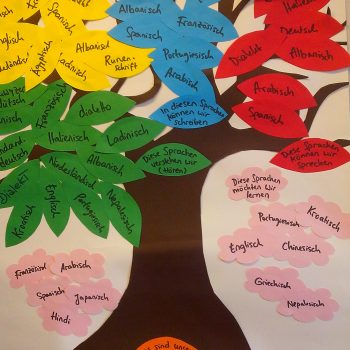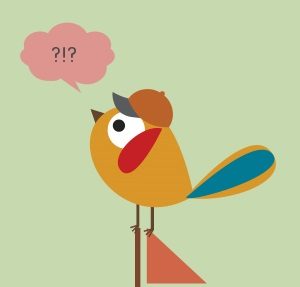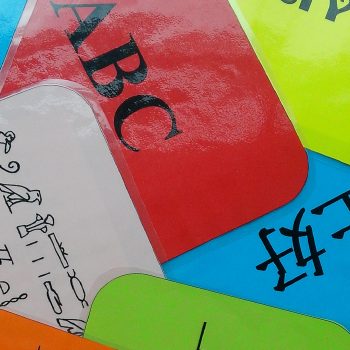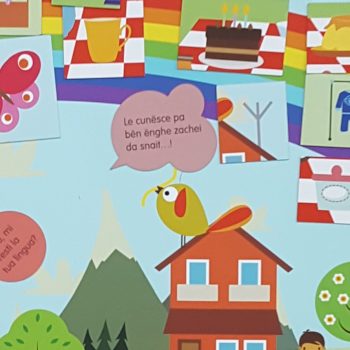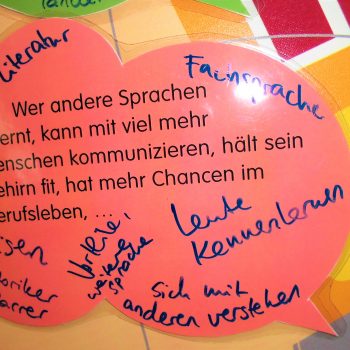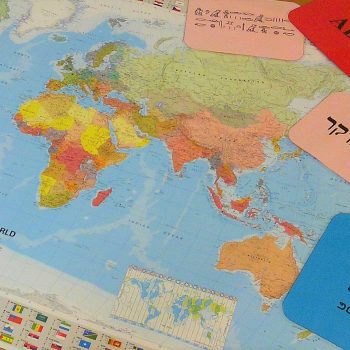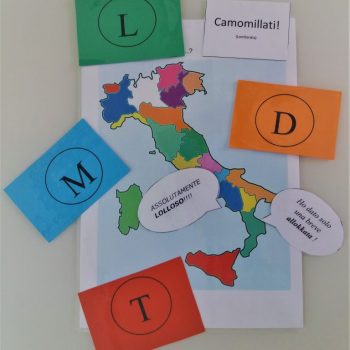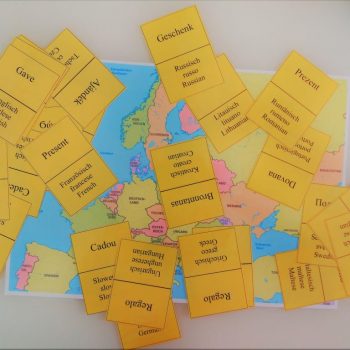Workshops
Multlingual, interactive workshops for schools in
Explore many different aspects of languages and multilingualism with your class. The following workshops are carried out by the SMS 2.0 team in schools. These topics can also be explored autonomously with our free, downloadable lesson materials.
Students can get creative visualising and reflecting on their multilingualism by drawing individual “language zoos” and creating a collective “language tree” as a whole class. They can present and discuss the meanings of their language portraits.
Age groups: Primary school, middle school
Set-up: classroom with a chairs in a circle, tables, flip chart/board
Even when we don’t speak, we communicate – for example through our clothes, gestures or behaviour. Language does not just mean using spoken words, but making oneself understood in many different ways. Students gain an awareness of “other” forms of communication and the diversity of language by exploring onomatapoeia, animal language, international finger counting and more.
Age groups: Primary school, middle school
Set-up: classroom with a chairs in a circle, tables and chairs, flip chart and/or board
There are different ways of writing: alphabets which represent sounds with letters, and some which represent objects or processes with symbols. Students get an introduction to the most well-known alphabets, exploring their evolution, curiosities and myths. They have the opportunity to write in different alphabets – maybe a new one might be developed too?
Age groups: primary school, middle school
Set-up: circle of chairs, tables in for groups, flipchart/board
Playing and learning about languages come together in the language game. The classroom becomes a giant board game as students roll the dice and answer questions. In this way students not only discover new facts about languages around the world, but they can also put their existing language knowledge to the test and become real language experts!
Age groups: primary school, middle school
Set-up: classroom or other location big enough for a circle of chairs. The floor will be used as the playing field.
Students become researchers and discover the fascinating history of the migration of words and sayings. For example, the word “giraffe” originates from Arabic whereas the word “market” comes from Latin. In other languages too there are “foreign words” or loan words that are used everyday. Some words that come from other languages have been adapted for use in the new language. Etymology is defining the origin of words, and this workshop should demonstrate the presence of etymology in our everyday lives.
Age groups: middle school, high school
Set-up: Chairs, group tables, board, projector & screen
How many languages is there space for in our brains? How do polyglots manage to learn over 10 languages? How come everybody learns differently? Students can share and use their language learning experiences, using them to become aware of their language biographies and help for future language learning. They formulate learning goals, and learn through practical activities which tools can help them reach their goals.
Age groups: middle school, high school
Set-up: Chairs, group tables, board, projector & screen
Is there such thing as “big” or “little” languages? If so, who decides on such categories? How come people always talk about French or Spanish, but we know so little about Arbëresh or Sorbian? How is it possible that languages are still dying out in today’s day and age, and how can we save them? This workshop offers the opportunity for students to discuss these topics and try to find answers as they go on a journey of discovery of lesser-known languages in Europe!
Age groups: middle school, high school
Set-up: Chairs, group tables, board, projector & screen, pc
Minority languages, dialects, regional and local varieties make Italy the European country with the biggest language diversity. The 120-minutes workshop aims to make participants aware of this diversity and, above all, what it consists of. The classroom will become the “playing field” and participants will discover through questions and activities, for example, the difference between language and dialect, youth slang and will work with Latin, which has played and still plays a key role in the linguistic history of the country.
The questions and activities will be adapted according to the age and the language skills of the participants.
Age groups: primary school, middle school, high school
Set-up: classroom or other location big enough for a circle of chairs. The floor will be used as the playing field.
In this workshop, the participants go on an imaginary language journey through Europe where they will discover the similarities and differences between European languages. The journey will end in Brussels, where Europanto, the artificial language that “mixes” European languages without any rules, was born. And just like in Brussels, participants will also be asked to invent their own “Europanto” by drawing on their linguistic knowledge and creativity!
Age group: middle school
Set-up: chairs, group tables, board, projector and screen
Book the workshops
Practical information:
- Workshops are carried out in schools by the SMS 2.0 team members
- Each workshop lasts 90 minutes, with the exception of nr. 8 that lasts 120 min.
- With the exception of workshop number 5, all workshops are carried out in 2 or 3 languages by the SMS team (combinations of German, Italian and English).
- Paid workshops
Availibility:
Please use the contact form to get in touch with the SMS team. We will then arrange a convenient date with you.
Submit a booking request
Please include:
- the name of your school
- possible dates you would like to book workshops
- the title or the number of the workshops you would like to book for your class
We will reply to your message via email to let you know if your request has been successful.

